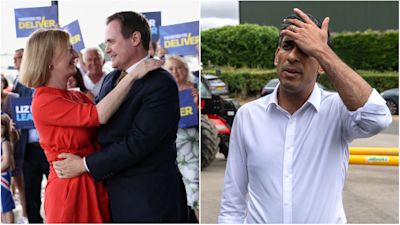Rishi Sunak struggles to keep up in race to be PM as Liz Truss gets more senior backers

Rishi Sunak is struggling to keep up in the race to be prime minister, with rival Liz Truss pulling further ahead after winning the support of more Conservative heavyweights.
But the foreign secretary insisted it was a “very, very close race,” while trumpeting her “support from right across all parts of the Conservative Party” after gaining Tory centrist Tom Tugendhat’s backing.
Mr Sunak, who has consistently trailed Ms Truss in polls of party members, faces an uphill battle to win them over before ballots start landing on their doorsteps next week.
Both contenders are continuing to flit across the country to meet voters, with Mr Sunak tweeting photos of himself with supporters in key southern constituencies with the caption: “Busy Saturday meeting hundreds of members. Wouldn’t have it any other way!”
Want a quick and expert briefing on the biggest news stories? Listen to our latest podcasts to find out What You Need To Know...
His latest plans in a policy blitz designed to revive his flagging campaign included slashing the number of shuttered shops on Britain’s high streets, allowing tougher punishment for graffiti and littering, and expanding police powers to tackle anti-social behaviour.
Mr Sunak also told The Sunday Telegraph he would levy a £10 fine for patients who miss GP and hospital appointments as part of a “transformative” overhaul of the NHS.
The former chancellor also acknowledged to the newspaper he is “playing catch-up” to Ms Truss as he seemingly sought to claim the sought-after underdog status.
The 42-year-old alluded to the fallout from his wife’s tax status when he appeared to suggest some commentary claimed he “wouldn’t even have been a part of this contest” if she had not announced her decision to pay UK taxes on her overseas income while he was still chancellor in April.
Earlier, he attacked “woke nonsense” in a speech in West Sussex, in an apparent attempt to outdo Ms Truss on so-called culture war issues that appeal to the right of the party.
In hardened rhetoric, he pledged to prevent “left-wing agitators” from taking “a bulldozer to our history, our traditions and our fundamental values”.
But the former chancellor was dealt a blow by accusations that he blocked efforts to overcome the Brexit impasse with the European Union.
The attack came from Ex-Northern Ireland secretary Brandon Lewis, who declared his support for Ms Truss and said he trusts her more to achieve a swift return to powersharing in Northern Ireland if she becomes prime minister.
The former Cabinet minister’s endorsement of Ms Truss followed that of senior Tories Mr Tugendhat and Defence Secretary Ben Wallace.
Criticism from his fellow Tories also came from Lord Forsyth, who served as a minister under Margaret Thatcher and Sir John Major.
The former cabinet minister accused Mr Sunak of a “tendency to be driven by Treasury orthodoxy” and of giving an “impressive and polished technical performance” but lacking “empathy, foresight and vision”.
Lord Forsyth added: “Conservatives believe in sound money, encouraging small business and lower, fairer, flatter, simpler taxes. I’m not sure Rishi entirely gets that.”
During a campaign stop in Bromley, the foreign secretary was asked whether her advantage over Mr Sunak in member surveys meant the contest is hers to lose.
She told reporters: “This is a very, very close race, and I am fighting for every vote.”
She said she was “absolutely delighted” about Mr Tugendhat’s support, but described it as “extremely premature” to say whether she would appoint him foreign secretary, a job Mr Tugendhat indicated he hoped to get while insisting he had been “promised nothing”.
Ms Truss said: “He is a very, very talented person and I’m very grateful to have the support from right across all parts of the Conservative Party because we need to reunite after this leadership election.”
Her latest policy announcements include a six-point plan on education, under which she promised that pupils with top A level grades would get an automatic invitation to apply for Oxbridge and other prestigious universities.
Branding herself the “education prime minister”, she also vowed to replace failing academies with “a new wave of free schools” and improve maths and literacy standards.
Ms Truss also told The Telegraph there would be no second referendum on Scottish independence “on my watch,” with her rejection appearing to go further than Boris Johnson’s assertion that now was “not the time”.
Both candidates to succeed Mr Johnson also pledged to “champion the rural way of life” in pitches to countryside Conservative voters.
While a BMG Research poll of party faithful for the i newspaper was the latest to put Ms Truss ahead of Mr Sunak with a double-digit lead, a survey of Tory councillors saw the two contenders nearly neck-and-neck.
Ms Truss was on 31% and Mr Sunak on 28% among 511 local Conservative politicians polled by Savanta ComRes, figures that may offer the the ex-chancellor’s campaign some hope.
Mr Tugendhat, who joined Ms Truss at her campaign event at Biggin Hill Airport, rejected the idea that Mr Sunak should drop out of the race.
“No, he shouldn’t stand down,” said Mr Tugendhat, who was himself recently eliminated from the contest.
“He should be competing and challenging to win the votes and support of members across the United Kingdom and I’m sure he will.”